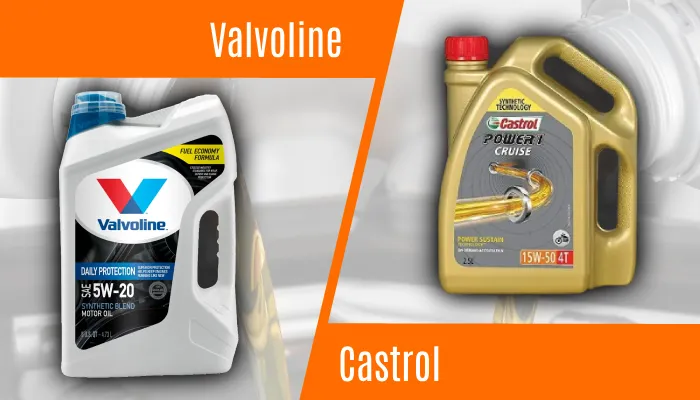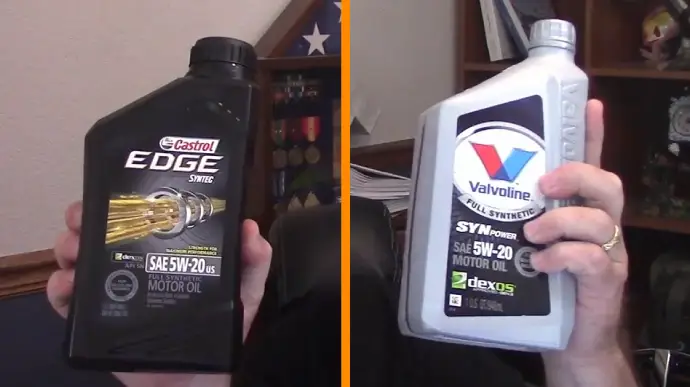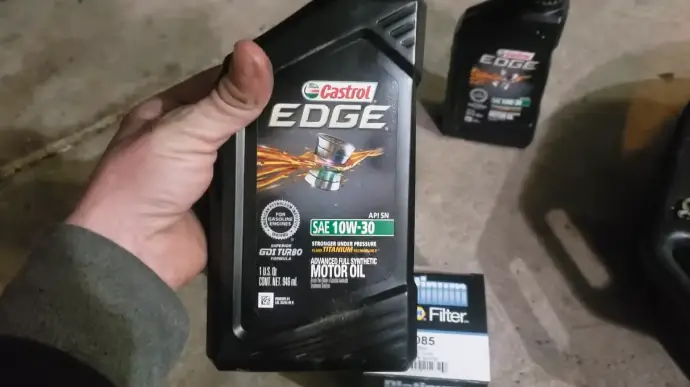Physical Address
304 North Cardinal St.
Dorchester Center, MA 02124
Physical Address
304 North Cardinal St.
Dorchester Center, MA 02124

Among the many engine oils you can choose for your vehicle, two prominent brands often stand out: Valvoline and Castrol. Both have a rich history in the automotive industry and offer a wide range of engine oils. However, their product line has several key differences.
Valvoline has a long history and holds third place in car motor oil branding in the U.S. Its base oil formulation prioritizes engine protection in extreme conditions. However, Castrol has extensive global reach as a subsidiary of BP. Its formulation focuses on reducing wear and improving fuel economy.
Today, we’ll dissect their differences, exploring their main focuses and whether you can mix their oils. Get ready to fuel your knowledge and make an informed decision for your vehicle’s performance.

When comparing Valvoline and Castrol engine oils, consider several key differences.
Valvoline, with over 150 years of experience, has established itself as a trusted brand in the automotive lubricant industry. It currently holds the third position in car motor oil branding in the U.S.
On the other hand, Castrol, founded in 1899, operates in more than 40 countries and is a subsidiary of BP. This global presence allows Castrol to cater to a wide range of customers worldwide.
Both Valvoline and Castrol have a long-standing history and have built a strong reputation in the market.
Valvoline offers various engine oils, including Premium Conventional, DuraBlend, MaxLife, and SynPower. Each formulation meets specific needs, such as providing enhanced protection, extending engine life, or improving fuel efficiency.
In contrast, Castrol offers various versions like GTX and Edge, focusing on performance and fuel efficiency. These different formulations cater to different needs, allowing consumers to choose the engine oil that best suits their requirements.
Valvoline’s base oil formulation protects engines in extreme conditions. It’s engineered to maintain fuel efficiency throughout the lifespan of the oil. This formulation ensures that the engine is well-protected even in challenging driving situations.
Conversely, Castrol has a distinct base oil formulation focusing on reducing wear and improving fuel economy. This formulation is particularly suitable for high-stress driving conditions, where the engine is subjected to intense pressure and heat.
Valvoline employs the ‘Dual Defense Additive’ technology in select formulations, which focuses on safeguarding the engine against various factors such as heat, wear, and deposits. This technology provides enhanced protection and prolongs the engine’s life.
Meanwhile, Castrol incorporates ‘Fluid Titanium’ technology in its engine oil products. This additive technology improves engine performance and protection by creating a strong protective barrier on critical engine parts.
The ‘Fluid Titanium’ technology helps reduce friction and wear, ensuring smoother operation and improved fuel efficiency.
Valvoline is typically recommended for oil changes every 3,000 to 4,000 miles, making it suitable for more frequent maintenance. This shorter drain interval ensures the oil is regularly refreshed, providing optimal engine protection and performance.
Contrary to this, Castrol Edge offers a long drain interval recommendation of 15,000 miles. This caters to individuals who prefer extended oil change intervals, reducing the frequency of maintenance.
Valvoline is known for its exceptional performance in extreme temperatures. It has a lower pour point, so it flows more easily in cold weather conditions. This makes Valvoline a suitable choice for areas with harsh winters or those who frequently operate their vehicles in cold environments.
On the other hand, Castrol has a higher viscosity index and performs better at medium temperatures. This makes it ideal for various climates, including areas with moderate temperatures. Its ability to maintain viscosity and protect against wear and tear in these conditions makes it a reliable option for many drivers.
Valvoline is renowned for its premium lubricants, earning a top spot in the U.S. car motor oil market. Its specialization is developing high-quality lubricants that provide excellent engine protection, enhanced fuel efficiency, and extended engine life.
Meanwhile, Castrol has established a strong presence in Formula One racing and focuses on delivering customer-friendly products with the support of BP’s extensive resources.
Valvoline, recommended for gasoline engines, offers 2x to 6x more protection against viscosity breakdown than conventional oils while maintaining fuel efficiency. This means that Valvoline engine oil can provide better protection for your engine while ensuring optimal fuel consumption.
Alternatively, Castrol engine oil, such as GTX and Edge, is designed to flow well in both high and low temperatures. It offers sludge protection while also maintaining fuel efficiency. This makes Castrol a reliable option for maintaining engine cleanliness and performance while prioritizing fuel efficiency.
Castrol was priced at $24.22, while Valvoline was priced at $36.99 for a 5-quart amount. This means that Valvoline is approximately 53% more expensive than Castrol.
However, these prices may vary depending on the specific product and location. Despite the price difference, both brands offer competitive pricing with minor variations.
The following table summarizes the key differences between Valvoline and Castrol vehicle engine oils:
| Feature | Valvoline | Castrol |
| Company History and Global Presence | Founded in 1866, ranks 3rd in U.S. car motor oil branding. | Founded in 1899, operates in over 40 countries. |
| Product Offerings | Premium Conventional, DuraBlend, MaxLife, SynPower, and more. | Versions like GTX and Edge, with an emphasis on performance and fuel efficiency. |
| Synthetic Oils | Recommended for 3,000 to 4,000 miles. | Long 15,000-mile drain interval. |
| Specializations | Known for premium lubricants. | Presence in Formula One racing and a focus on customer-friendly products. |
| Performance Testing | Slight edge in heat dissipation. Minimal oil loss in evaporation tests. | Strong performance in heat dissipation and minimal evaporation. |
| Temperature Performance | Excels in extreme temperatures with a lower pour point. | Better performance at medium temperatures, suitable for a wide range of climates. |
| Fuel Efficiency Emphasis | Maintains fuel efficiency while offering engine protection. | Maintains fuel efficiency and offers sludge protection. |
| Compatibility with Car Brands | Broad compatibility, not specified for certain car brands. | Compatible with certain car brands like Ford, Honda, and Chrysler. |

Castrol’s product lineup primarily focuses on enhancing engine performance and maintaining fuel economy with various versions like GTX and Edge. The company recognizes the importance of these two factors in optimizing the overall performance of vehicles.
By enhancing engine performance, Castrol aims to provide customers with a smoother and more powerful driving experience. This is achieved through advanced additives and lubricants that reduce friction and wear, improving engine efficiency and responsiveness.
Castrol’s products are also designed to maintain fuel economy, helping drivers save on fuel costs and reduce their environmental impact. Through continuous research and development, Castrol ensures that its product lineup meets the evolving needs of modern engines and vehicles.
You can’t mix Castrol and Valvoline oil together. Even if two different oil brands have the same viscosity, it isn’t advisable to mix them.
Mixing oils from different brands can lead to compatibility issues and may result in reduced performance and potential damage to your engine. Each brand has its unique formula and additives specifically designed to work together to provide optimal lubrication and protection for your engine.
Also, mixing oils from different brands can disrupt this balance and compromise the overall effectiveness of the oil. To ensure the best performance and protection for your engine, it’s recommended to stick with one brand of oil and follow the manufacturer’s recommendations for oil changes.
Using Valvoline or Castrol oils in diesel engines requires careful consideration of the product specifications to ensure compatibility. While Castrol is known for the quality of its synthetic blends designed for diesel engines, it’s important to note that Valvoline doesn’t explicitly mention its suitability for diesel engines.
When selecting an oil for your diesel engine, it’s crucial to check the product specifications provided by the manufacturer. Look for oils that meet the requirements and recommendations outlined in your vehicle’s owner’s manual.
These specifications usually include viscosity, API rating, and any additional certifications required for diesel engines.
The choice between Valvoline and Castrol engine oils depends on various factors, including your vehicle’s needs, performance requirements, and budget. When comparing Valvoline and Castrol engine oil, it’s evident that both brands offer high-quality products with slight differences in their formulations.
While Castrol focuses on advanced technology and performance, Valvoline emphasizes protection and durability. Also, it’s generally recommended to avoid mixing different oil brands, but both Valvoline and Castrol oils can be used in diesel engines.
Whether you opt for Valvoline’s long-standing reputation or Castrol’s association with Formula One, rest assured that you’re making a safe choice for your engine’s well-being.
Last update on 2025-07-12 / Affiliate links / Images from Amazon Product Advertising API